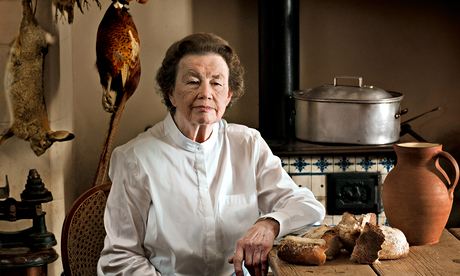
A life lived through the kitchen is something I would thoroughly recommend. I've been very lucky in that regard. I've had a very good life. Many things have changed, of course. I started in the Mulberry Tree in Stratford-upon-Avon in the 1950s and when I arrived there, it still had a coal-fired range – though that went shortly afterwards and we were then on gas. The restaurant was a spin-off from a wine merchants and was only small, about 30 covers. I was the only woman there but that wasn't an issue. I was just a pair of hands and a pretty raw pair of hands at that. The chef was a chap called Douglas Sutherland who had trained prewar and wore a big white hat. He was the only real professional in there.
These were still the days of rationing so there wasn't much meat on the menu. The food was essentially the repertoire de la cuisine. We'd boil a fowl in the afternoon and use the stock to make a velouté and then make chicken à la king [in cream sauce] and the flavour in the sauce was mind-blowing. It was a very enjoyable job and there wasn't much shouting. There wasn't any need. There is never any need for chefs to be shouty. It's one of the reasons I find MasterChef so embarrassing. There's an aggressive attitude there, which I don't like at all. I do like Great British Bake Off. It's just rather civilised.
After the Mulberry Tree I answered a job in The Lady and went to work for George Perry-Smith at the Hole in the Wall, in Bath. That was very different, a revelation. We served French onion soup and grilled Dover sole and ricotta al caffe. I'd read one of Elizabeth David's books but I'd never seen any of the dishes she wrote about until I went to work there, things like salade niçoise, piperade, quiche, risotto and fish soup. When it came out, George gave me a copy of her French Provincial Cooking, and it's been re-bound many, many times because I still cook from it. Old recipes like those have an awful lot to teach us. Cooks should never forget the old recipes. Her recipe for saddle of hare in a cream sauce is a real treat. Once a year I have a hare and I prep it myself. It's a very satisfying thing to do.
Perry-Smith's attitude to running restaurants was that you came and did some cooking and some time front of house. If you worked front of house and had free time you came into the kitchen and helped out, and likewise those of us in the kitchen delivered dishes to the tables. This is something I continued into my restaurant the Carved Angel in Dartmouth, when I opened it in 1972. It think it serves a restaurant well, to have fluidity. It makes for a friendlier working environment. Now, however, the chef is king and the food is totally plated in the kitchen. That's a shame because certain skills in the dining room have gone. We used to carve wild duck tableside and portion the tarragon chicken. Some places have started to bring back that table theatre and that's very pleasing. We also had an open kitchen at the Hole in the Wall, which again has come back into fashion. I think that's a very good thing. People are scared at first of open kitchens because they fear it will force them to act in a certain way and they're right. It means you work quietly.
At the Carved Angel I wanted to use local ingredients. I wanted to make local food, using the wonderful local produce. You don't need truffles with everything. You just cook as well as you can. I think it's lovely that localism has become such an important thing in restaurants these days. There should be a difference between your restaurant and the one a hundred miles away. I was very pleased when we won a Michelin star, and very disappointed when we lost it. Awards are important. You're always pleased to see an award or a positive listing in The Good Food Guide. What's really important for a cook is to eat and love eating. I'm surprised that some young cooks seem to survive on burgers. It just seems funny to me. I educated my own palate through the food served at the restaurants I worked at.
I'm often asked if it's a good profession for women. I would definitely recommend it, though it is difficult to lead a normal life and have children, and so on. It just is. If I'd had a family I would have had to give it up. You can't pretend it's a simple thing to do. I had a relationship with a Spanish chap who was a waiter for 35 years and he understood how the job worked. I enjoyed what I did and I didn't want a family.
I loved the camaraderie in the kitchen, the feeling as you all worked together in the kitchen coming up to service. That's what I miss since I retired in 1999. And so if you asked me for my advice for young cooks now it would be: just enjoy yourself, the food, the cooking and the company.

